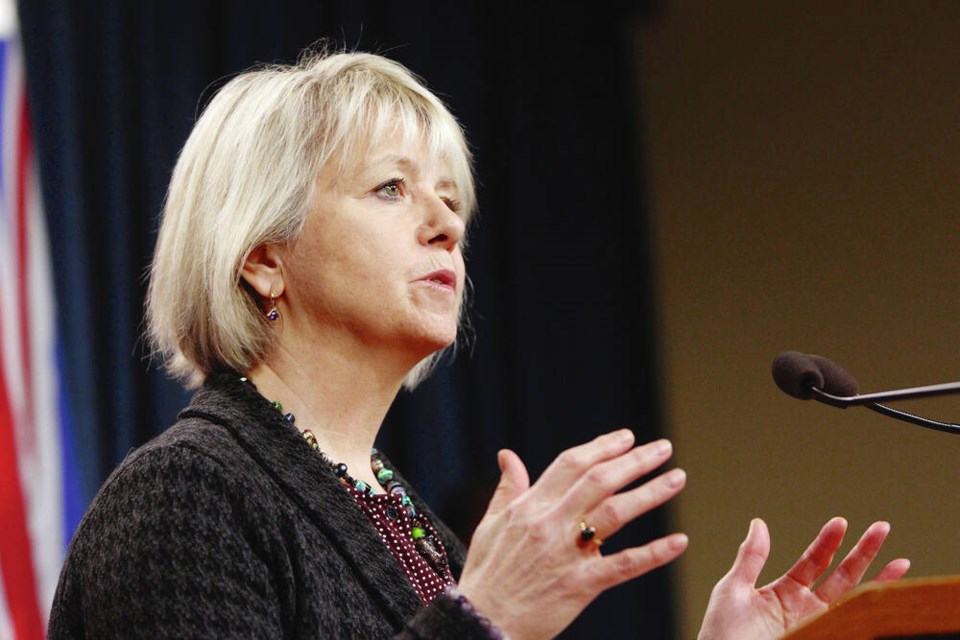B.C.’s provincial health officer is backing the government’s controversial prescribed safer-supply drug program, and recommends broadening it to include pharmaceutical heroin and fentanyl.
Dr. Bonnie Henry released her 96-page report at a news conference Thursday.
It includes recommendations to maximize benefits of prescribed safer supply and mitigate potential harms, feedback from 74 front-line clinicians and people who use drugs, evidence from 99 experts across the province, and an ethics review.
The review endorses the safer-supply program introduced in 2020 by the NDP government in B.C., the first jurisdiction in Canada to implement a provincial prescribed safer-supply program.
It allows clinicians to prescribe a regulated alternative opioid to people who use drugs, to prevent sometimes fatal poisonings from toxic street drugs.
Henry was asked last year by the government to investigate the benefits and risks of the program.
Her review endorses expanding the program from the current use of mostly hydromorphone tablets to the witnessed provision of prescribed heroin (diacetylmorphine) and fentanyl powder and patches, and injectable morphine to be taken in medical settings — or, for those who can’t access doctors, non-medical settings such as compassion clubs.
The report says 4,331 people have access to prescribed safer supply including hydromorphone, and 24,370 people use opioid agonist therapies including methadone and suboxone.
That leaves the majority of the 115,000 people diagnosed with opioid use disorder in B.C. — and more who use drugs but are not diagnosed — at risk of being poisoned by powerful fentanyl-laced street drugs, it says.
The review also found, however, that more evidence on safer supply is needed and that “some” diversion of safer supply from its intended use is occurring. It also follows a chief coroner’s report last month that showed an all-time-record 2,511 toxic drug poisonings in B.C. last year despite interventions.
The safe-supply model and decriminalization of carrying personal amounts of drugs are the subject of intense political debate.
BC United and Conservative MLAs want to see a greater focus on recovery and treatment, while harm-reduction experts say prescribed opioid alternatives aren’t saving enough lives because people who use drugs can’t get the prescriptions for various reasons.
Some physicians and politicians have also voiced concerns that safer-supply prescription opioids including hydromorphone (Dilaudid or Dillies) are being sold for cheap on the street by users chasing a more potent drug and ending up in the hands of youth, hooking new users and causing recovered addicts to relapse.
“Anecdotal reports have suggested that youth may increasingly be accessing diverted hydromorphone,” the report says.
The review says concerns over diversion of prescribed opioids should be viewed as a failure to meet the needs of people who use drugs, who may trade or sell prescribed hydromorphone for more powerful substances such as fentanyl.
The provincial health officer recommends a model that includes a person being able to take their prescribed supply away to use later once a relationship with a clinician, medical clinic or pharmacy is established.
At a news conference following the report’s release, Mental Health and Addictions Minister Jennifer Whiteside said the government is reviewing the recommendations to determine next steps.
In the context of a poisoned drug supply that took the lives of 2,511 British Columbians last year, “we are required to do everything that we can across the entire continuum of care to save lives,” said Whiteside.
She said access to opioid antagonist programs like methadone or suboxone are important tools in the toxic drug crisis and the government will continue to work to improve the current model.
Victoria hospitalist Mark Mallet, who has raised concerns about diversion of safer-supply drugs, said he is not concerned about Henry’s recommendation for the expansion of prescribed alternative drugs, although he rejected the chief coroner’s recommendation last year that the drugs be given without a prescription or outside a supervised setting.
Mallet said he was also reassured to hear Henry call for more evidence and study.
“On a personal level, though, I would say this program has been in place for four years, so why are we just now saying we should collect better evidence?” he said. “I think we are far behind where we should be in terms of gathering good evidence.”
BC United Mental Health and Addictions critic MLA Elenore Sturko said in a phone interview she was pleased to hear diversion listed as a recognized harm in the review. She said data collection and rigorous review should have been more of a focus of the programs.
“It’s frightening the extent of the risks we’re taking in this province right now with very little evidence,” said Sturko, who supports calls for drugs to be supplied only in witnessed settings. “We should be taking even greater safety precautions going ahead.”
The recommendation to expand the program to include more potent medications makes it even more urgent to implement greater safety protocols so the safer-supply drugs don’t end up in the wrong hands, Sturko said.
She stressed the program needs to be part of a plan for drug users to progress to treatment and recovery.
The review released Thursday also says there need to be “substantial increases” in supportive and low-income housing because of the links between poverty, homelessness and “problematic” drug use.
Wednesday marked the one-year anniversary of the decriminalization of possession of small amounts of opioids and other drugs in B.C. under a three-year exemption from Health Canada.




